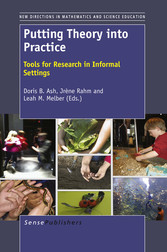PUTTING THEORY INTO PRACTICE - Tools for Research in Informal Settings
von: Doris Ash, Jrène Rahm, Leah M. Melber
SensePublishers, 2012
ISBN: 9789460919640
Sprache: Englisch
195 Seiten,
Download: 3103 KB
Format: PDF, auch als Online-Lesen
eBook anfordern
▸
Mehr zum Inhalt

PUTTING THEORY INTO PRACTICE - Tools for Research in Informal Settings
Informal learning, also called free choice learning or out-of-school time, is a relatively new field that has grown exponentially in the past 15 years. Research on the learning and teaching that takes place in these non-traditional, non-classroom environments, such as museums, gardens, afterschool and community programs, has enjoyed tremendous growth; yet we still need to understand much more, and more deeply, how people actually interact, participate and learn in such settings. Putting Theory into Practice: Tools for Research in Informal Settings is designed as a research and practice toolkit, offering a range of theoretically well-grounded methods for assessing learning for life in diverse settings and among diverse populations. We pay special attention to the full complexity, challenges and richness involved in such research into learning in places like museums, aquariums, after-school clubs, and gardens. Putting Theory into Practice serves both, researchers and practitioners, as well as a more general audience. This book offers several field-tested methods for building empirically-based, informal learning settings and research deeply grounded and guided by theory. Sociocultural theory, broadly defined, forms the unifying theoretical framework for the different qualitative studies presented. Each chapter clearly lays out the theoretical underpinnings and how these inform the suggested methods. The chapters are written by recognized experts in the field, and each addresses, in its own way, 'the synergy among different learning contexts and the benefits of studying how contexts influence learning.' Together they give voice to the diversity, richness, and complexity of the study of learners and learning for life.

